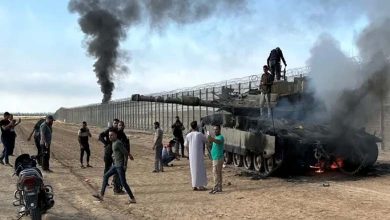With the heat wave in the world, how are foreign workers facing the Qatari hell?

Construction workers in Qatar are facing a scorching summer season these days, with great pressure to finish the World Cup buildings and facilities scheduled for late this year, with temperatures already exceeding 50 degrees Celsius (122 degrees Fahrenheit) in parts of the desert region that are bearing the brunt of climate change.
Hell of Qatar
In addition to the risks of dehydration, sunstroke and heart failure, most of the Gulf countries have banned working outside in the hottest hours of the day. Qatar insists on forcing workers to work for long hours at construction sites without any rest, so workers fall one by one like leaves, some of them unable to endure and die their last breaths, and others survive with a series of deadly diseases. “We can no longer bear all this pressure and heat,” said Saguy, who works at one construction site.
The agency reported that last year a WHO report found that the risk of death tripled on the hottest days in Qatar, with a disproportionate impact on non-Qatari men, who make up the bulk of outdoor workers. Workers from India, Pakistan, Nepal, Sri Lanka and Bangladesh are scattered throughout the small gas-rich Gulf state, and foreign workers usually work on construction sites, collect garbage, clean roads or deliver food. Although Qatar agreed to a four-hour midday work stoppage in June, July and August, as the tournament approached, the agreement became ink on paper.
Human rights anger
According to the agency, human rights groups have urged Qatar, which is hosting this year’s World Cup, to investigate worker deaths linked to the heat waves, in the absence of reliable figures on migrant worker deaths in Qatar that do not publish statistics, and have regularly objected to estimates by NGOs and the media.
A recent study conducted by Vital Signs, a group of human rights organizations mainly from Asian countries, reported that hundreds of migrant workers from South and South-East Asia die in Qatar every year. The March 2022 report stated that more than half of the cases were recorded as “natural causes” or “cardiac arrest.” This comes at a time when a study published in Science Advances in 2020 found that the Gulf region has the hottest and humid weather anywhere on Earth. According to scientists, even with shade and unlimited drinking water, a healthy adult will die if temperatures taking into account factors such as humidity, wind speed and cloud cover exceed 35 degrees Celsius for six hours a day, meaning that thousands of workers face death.












